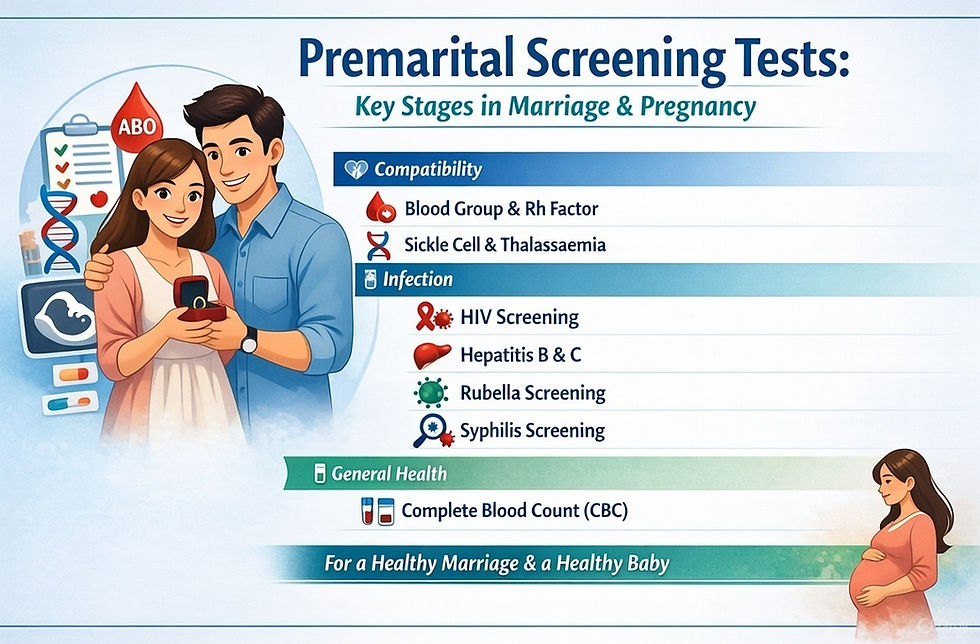Essential Cancer Health Checks for Men
- EJB
- Dec 12, 2024
- 3 min read

In the realm of men's health, proactive screening for cancer can be a lifesaver, offering the possibility of early detection and better treatment outcomes. As we age, the risk of certain cancers increases, making regular health checks not just advisable but essential. Here's a detailed look at the crucial cancer screenings men should consider.
1. Prostate Cancer Screening
Prostate cancer is one of the most common cancers among men, particularly as they age. Here are the primary screening methods:
Prostate-Specific Antigen (PSA) Test: A blood test measuring PSA levels, which can be elevated in prostate cancer. However, PSA levels can also rise due to benign conditions. Thus, it's crucial to discuss with your healthcare provider about the risks and benefits of PSA screening, especially if you're over 45 or have a family history of prostate cancer or are of African descent.
Digital Rectal Exam (DRE): This involves a physical examination where the doctor feels the prostate through the rectum to check for any abnormalities.
2. Colorectal Cancer Screening
Colorectal cancer, which includes both colon and rectal cancer, is another significant concern for men, especially post-50:
Colonoscopy: Considered the gold standard, it allows doctors to examine the entire colon for polyps or cancer. It's recommended starting at age 45, or earlier if you have risk factors like a family history of colorectal cancer.
Stool Tests: Fecal occult blood test (FOBT) or fecal immunochemical test (FIT) can detect hidden blood in the stool, potentially indicating polyps or cancer. These tests are simpler but require more frequent follow-ups.
3. Skin Cancer Screening
Given that men are more likely to develop skin cancer, regular checks are vital:
Self-Exam: Checking your skin regularly for any new or changing moles, spots, or lesions is key. Look for the ABCDEs of melanoma: Asymmetry, Border irregularity, Color variation, Diameter greater than 6mm, and Evolution or change over time.
Professional Skin Exam: Dermatologists or primary care physicians can perform a full-body skin check, which is particularly important for men with a history of severe sunburns, many moles, or a family history of skin cancer.
4. Testicular Cancer Screening
Though less common, testicular cancer predominantly affects younger men between 15 and 35:
Self-Examination: Monthly self-checks for lumps, swelling, or changes in the testicles can lead to early detection. However, the U.S. Preventive Services Task Force (USPSTF) does not recommend routine testicular self-exams due to lack of evidence showing benefit. If you notice any changes, see a doctor for a professional evaluation.
5. Lung Cancer Screening
For men with a significant smoking history, lung cancer screening can be life-saving:
Low-Dose CT Scan: Recommended for men aged 55-80 who currently smoke or have quit within the last 15 years, with at least a 20 pack-year smoking history. This screening can detect lung cancer at an early, more treatable stage.
Additional Considerations
Genetic Counseling: If there's a strong family history of cancer, genetic counseling or testing might be advised to assess risks for hereditary cancers.
Lifestyle Factors: Regular screenings should be complemented with lifestyle choices like not smoking, moderate alcohol consumption, a balanced diet, and regular exercise, which can reduce cancer risk.
Mental Health: The stress of cancer screening and potential outcomes can be significant. Addressing mental health, including discussing any concerns with a healthcare provider, is part of holistic health care.
Conclusion
Proactive cancer screening is a critical aspect of men's health maintenance. While these screenings can be uncomfortable or daunting, the potential to catch cancer early when it's most treatable cannot be overstated. Men should discuss their screening options with their healthcare provider to tailor a plan that considers their health history, risk factors, and personal concerns. Remember, early detection isn't just about extending life; it's about improving the quality of life.




Comments